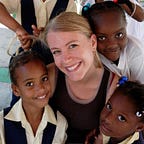Becoming a Mother in Africa
Imagine being pregnant in a region where your baby has a one in five chance of not making it…
I’m pregnant. In the USA. Among other things, that means I observe a slew of rules about what I should and shouldn’t eat, and see a midwife for blood tests, sonograms, and various other screenings every month.
A few months ago, I went on a trip to Sierra Leone. Just before I left, I took a test to make sure I wasn’t pregnant. If I was, I would have cancelled the trip. Too many diseases, too much risk, and too little health care available.
But I couldn’t help thinking about the millions of women who have no choice, because they live there. They are pregnant in a country where malaria threatens them at every mosquito bite, malnutrition is rampant, and there are only 3 doctors for every 100,000 people—one of the lowest proportions in the world. In the rural Upper Banta chiefdom where I was traveling with Children of the Nations (COTN), about 1 in 5 babies don’t make it to their fifth birthday.
So what is it like to be pregnant in Africa? “I’m scared,” says Jeneba, a 15-year-old girl, recently given in marriage to an older man from her village. She’s walked for about an hour to get to the COTN clinic today. She’s pregnant with her first child, and her tiny body looks barely able to support the weight of her growing belly.
But Jeneba’s nervous face breaks into a slow smile when the singing begins. The clinic might not have running water or electricity, but they know how to reach the people. In an area where very few can read—least of all the women—pamphlets won’t do much to help.
So they sing about everything they need to remember. One song addresses general hygiene during pregnancy. The other goes even further, graphically describing every possible way to get diarrhea. The last is a funny song, about being proud of your pregnancy and telling everyone who the baby’s daddy is—a technique to make sure he supports you and the baby later. The women dance around in circles, ending up in pairs at the end of each stanza, when they bump bellies and break down laughing.
When the singing is over, the women come into the clinic one at a time for an exam. Jeneba’s turn comes, and the nurses are happy to find a healthy heartbeat. But they are worried about her, and recommend she deliver her baby at the closest hospital—about an hour’s drive away.
A few days earlier I had seen a baby born at COTN’s clinic. As the baby came out, the nurses saw that the umbilical cord was wrapped around the baby’s neck three times. They cut it quickly, and within seconds had the baby free and breathing well.
Later I asked my team leader, a nurse practitioner from Bremerton, Washington, what would have happened to that baby if it wasn’t born in the clinic. She shrugged, not giving me a clear answer. “Here, they are just so used to 1 in 5 not making it,” she said, shaking her head.
Thanks to this clinic, those statistics are changing for mothers and babies. Whether young mothers are learning about prenatal health, or rushing their little babies to the malnourishment clinic, more babies are surviving, and fewer young women are going into motherhood with the grim expectation that their children only have a 4 in 5 chance.
Children of the Nations has been serving in Sierra Leone since 1995, and has been in the rural Upper Banta chiefdom since 2004. With support from thousands of sponsors and other partners, they provide health care, education, clean water, and more for hundreds of children in this impoverished region.
If you would like to be part of helping mothers in Sierra Leone, you can do so this Mother’s Day. Make a gift in your mother’s name to feed a malnourished child in Africa, and we’ll provide you with a card for her, explaining the impact of your gift. Or, help a mother support her children by sponsoring a child.
